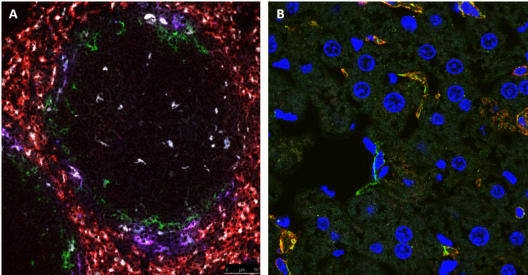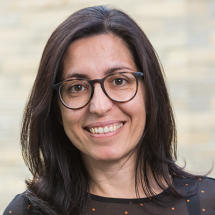Prof. Dr. Noelia Alonso Gonzalez
No positions via CiM-IMPRS in 2026
Interactions between macrophages and lymphocytes during development and inflammation

Cell Biology / Molecular Biology
Immunology
Numerous transcription factors have been described as key regulators of the establishment of tissue-resident macrophages during development. They dictate specific gene expression patterns, at the level of macrophage precursors, that are shaped by the microenvironment and ultimately define their core transcriptional signature. However, whether these transcription factors also modulate further functions of macrophages during inflammatory diseases is still unknown. We aim to decipher how tissue-resident macrophages communicate with their inflammatory-recruited counterparts and with the lymphocytes implicated in the inflammatory reaction and what is their contribution to the overall immune response. Several developmental aspects of these interactions between macrophages and lymphocytes will be also studied. The project involves a major part of in vivo experiments using reporter and inducible mouse models in combination with diverse inflammatory models. Fate mapping methods will be performed using these reporter and inducible mouse models to follow the origin of macrophage populations in development and disease. In vivo and ex vivo imaging technologies will be applied as well as high throughput sequencing techniques at the single cell level. The PhD student will be working in a young fresh and highly cooperative environment applying state-of-the-art genomics and imaging approaches combined with in vivo disease models

Vita
- 2005-2010: Research Associate with Prof. Antonio Castrillo, Las Palmas de Gran Canaria University, Spain
- 2010-2012: Postdoctoral Fellow with Prof. Nancy Ruddle, Yale University, USA
- 2012-2016: Postdoctoral Fellow with Prof. Andres Hidalgo, CNIC, Spain
- 2017-2018: Researcher from Apr 2017 to Nov 2017 at University of Muenster, Germany.
Institute for Immunology - Since 2018: Junior Group Leader at the University of Muenster, Germany. Institute of Immunology
Selected references
Casanova-Acebes M, Nicolás-Ávila JA, LiangYao Li J, García-Silva S, Balachander A, Rubio-Ponce A, Weiss LA, Adrover JM, Burrows K, A-Gonzalez N et al. (2018). Neutrophils instruct homeostatic and pathological states in naïve tissues. J Exp Med. 215:2778-2795
A-González N, Quintana JA, García-Silva S, Mazariegos M, González de la Aleja N, Nicolás-Ávila JA, Walter W, Adrover JM. Crainiciuc G, Kuchroo V et al. (2017). Phagocytosis imprints heterogeneity in tissue resident macrophages. J. Exp. Med. 1;214:1281-1296.
A-Gonzalez N, Guillen JA, Gallardo G, Diaz M, de la Rosa JV, Hernandez IH, Casanova-Acebes M, Lopez F, Tabraue C, Beceiro S et al. (2013). The nuclear receptor LXRα controls the functional specialization of splenic macrophages. Nat. Immunol. 14, 831–839.
Casanova-Acebes M, Pitaval C, Nombela-Arrieta C, Weiss LA, Chèvre R, A-Gonzalez N, Kunisaki Y, Zhang D, van Rooijen N, Silberstein LE et al. (2013). Rhythmic Modulation of the Hematopoietic Niche through Neutrophil Clearance. Cell. 153(5):1025-1035.
A-Gonzalez N, Bensinger S, Hong C, Beceiro S, Bradley M, Zelcer N, Deniz J, Ramirez CM, Diaz M, Gallardo G et al. (2009). Apoptotic Cells Promote Their Own Clearance and Immune Tolerance through Activation of the Nuclear Receptor LXR. Immunity. 31:245-58.
Links
